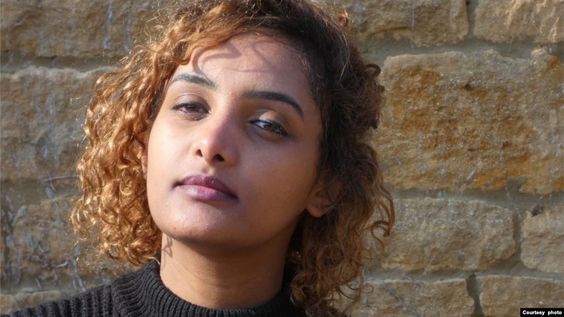Africa
Journalists in Ethiopia hope that their coverage of Tigray will lead to justice

Lucy Kassa had no intention of working as a war correspondent. The free-lance journalist covered problems with Ethiopia’s growth and economy while working for a Norwegian publication.
But shortly after, war broke out in her native Tigray region in northern Ethiopia.
“I had a different lifelong aspiration. “I never intended to get involved in all of this,” she told VOA.
In late 2020, Lucy started to compile witness and survivor stories of gang rapes, killings, and other human rights violations after she started getting unsettling tales of atrocities.
At the time, media access to the region was restricted, so she was reporting from Addis Abeba, the country’s capital. She also talked to well-known sources in the area and used geolocation and other methods to check the accounts.
But, Lucy said, more investigations that aren’t biassed are needed to find out what’s going on.
Reporting about the battle for two years has taken a toll.
“I have dedicated so much time to gathering evidence of war crimes. “I made a lot of sacrifices, even putting my life in danger,” stated Lucy.
In 2021, three unidentified armed men who broke into her house knocked her down.They interrogated her and looked through the information she had gathered for a tale. They stole her computer and her photos.
Lucy promptly left Ethiopia.She is now supported by a global organisation and resides in Europe. She withholds precise information about her life or whereabouts out of concern for her safety.
“This place is secure.” “My protection is provided by this group, but I have no social life with the Eritrean, Ethiopian, or even Tigrayan communities,” she stated.
When it comes to journalists being harassed or detained for their reporting on the war in Tigray, Lucy is not alone. In some areas of Ethiopia, authorities have also restricted access to the internet and mobile phones.
“The state of affairs in Ethiopia is extremely terrible.” In a letter response to VOA, Kiran Nazish, founding director of the Coalition for Women in Journalism (CFWIJ), expressed her organization’s deep worry for journalists’ safety.
“Over the past year, we have seen numerous journalists present breathtaking experiences of censorship, where journalists do not feel free to report without fear of retaliation from the government,” Nazish added. Meanwhile, we have seen a year in which arrests have drastically increased.
She claimed that frequently, arrests are made for no apparent cause.
A report from the Committee to Protect Journalists (CPJ) that came out in August says that at least 63 journalists have been jailed or put in temporary detention since November 2020. This is because they wrote about the war or other politically sensitive topics.
According to Angela Quintal, Africa programme coordinator at CPJ, “Since the civil conflict [in Ethiopia’s Tigray area] started two years ago, we have had several journalists who have been jailed for extended periods of time, frequently without trial.”
The Ethiopian Media Authority, which oversees journalism in the nation, and the prime minister’s office were approached by VOA for a response. Neither had replied before this article was published.
recording abuses
In Tigray, the Amhara, and Afar areas, the fighting has resulted in tens of thousands of deaths and millions of displaced people. The work of journalists has been crucial in exposing crimes on all sides of the conflict.
evidence of war crimes allegedly committed by Ethiopian federal forces, Tigrayan forces, and soldiers from neighbouring Eritrea, according to a team of UN investigators.
Since the crew was refused entry to the area, it gathered evidence by speaking with 185 people, including attack survivors.
According to The Associated Press, Ethiopia’s government rejected the study because it “exceeded its authority.”
Lucy says that her lack of access to war zones has been used to attack her research or cast doubt on the stories that survivors and witnesses have told her.But she can still clearly recall those interviews, as well as the tapes and pictures she went through to check the accounts.
Lucy explained that it’s depressing to realise that people can do all of these things and get away with it.”I was considering what the purpose of this was. If this effort isn’t going to offer me anything, what’s the point of being so consumed by it?
But Lucy’s work, which shows how rape was used as a weapon, has been recognised all over the world.
She most recently won the Magnitsky Award for investigative reporting. The awards for human rights were established in honour of Sergei Magnitsky, a Russian attorney who died while being held in a Moscow jail pending trial for his efforts to expose public wrongdoing.
Catherine Belton, a journalist who worked for many years as the Moscow correspondent for the Financial Times, called Lucy “a real journalistic hero.”
Belton remarked during his address at the prize ceremony, “She’s one of the bravest journalists I’ve ever met.”
When the prize was revealed, Lucy claimed to be in a dark place. She still finds it difficult to accept praise.
“I was quite depressed due to the difficulties I was under. She told VOA that the lack of responsibility for the war crimes done by all parties infuriated herbility for the war crimes done by all parties infuriated her. “I recall talking to a father who had a decent life [before the war] and who said that he was unable to provide for his child any longer since he was out of work.”
According to her, asking for assistance can be difficult. They don’t want to admit that they didn’t eat anything or that they are hungry. That has broken my heart.
Lucy hopes that ultimately the subjects of her reporting will receive justice as a result of her efforts.
“As a journalist, my only concern is gathering information to support the claims.” But I’m also a person. “You anticipate some sort of justice as a human being,” Lucy added.
